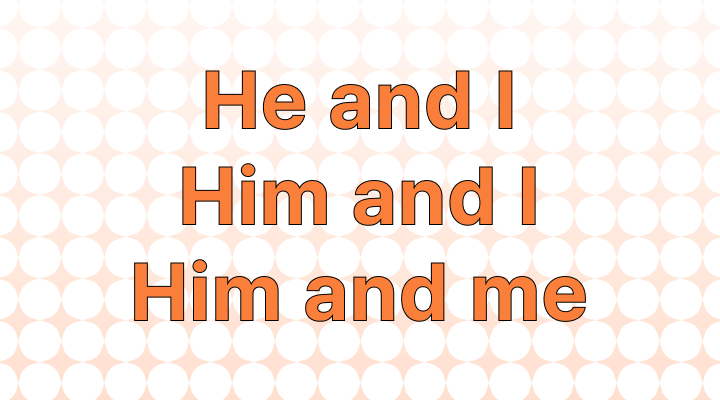- "He and I" is always correct when used as the subject. Whether your sentence is "He and I went to the library" or "The cake was shared between he and I," they're both the doers of the action, so subject pronouns is the grammatically correct choice.
- "Him and I" is never correct.
- The phrase "him and me" is correct when used as object pronouns in a sentence.
The use of pronouns have been a point of interest lately as there has been more fluidity in the type of pronouns that people use to describe themselves. For example in this survey, one-third of the youth surveyed exclusively use they/them pronouns. Three percent opt for he/him, and 2 percent choose she/her. A significant portion utilizes various combinations like she/they, he/they, or she/he/they. Additionally, some employ pronouns beyond the traditional three, such as ze/hir and e/em. Five percent exclusively adopt these unconventional pronouns, referred to as neopronouns.
With this new diversity, we need to be more mindful about how we refer to someone, but before that we need to make sure we are using this pronouns in a grammatically correct way.

Subject Pronouns vs. Object Pronouns: The Basics
Understanding the distinction between subject and object pronouns is key to using "he and I" or "him and I" correctly.
Subject Pronouns: The Stars of the Sentence
Subject pronouns are the grammatical protagonists, taking center stage as the doers of the action in a sentence. They perform the actions and drive the narrative forward. Here's a lineup of the subject pronouns:
- I
- You
- He
- She
- It
- We
- They
Examples:
- I love to explore new places.
- You are the captain of your destiny.
- She excelled in the science competition.
Object Pronouns: The Receivers of the Action
On the flip side, object pronouns step into the supporting roles, acting as the receivers of the action or as objects of prepositions. They play a crucial part in ensuring that sentences flow smoothly and convey accurate meaning. Here are the object pronouns:
- Me
- You
- Him
- Her
- It
- Us
- Them
Examples:
- She handed the book to me.
- The teacher praised you for your excellent performance.
- I invited him to the party.
Correct Usage: "He and I"
Use in Subject Position:
- Example: He and I went to the store together.
- In this case, "He and I" are the subjects of the sentence, indicating that both individuals performed the action of going to the store.
In Predicate Nominatives:
- Example: The winners were he and I.
- Here, "he and I" act as predicate nominatives, referring to the winners. In this context, subject pronouns are appropriate.
Example sentences
- He and I went to the park to enjoy the sunny afternoon.
- Despite the challenges, he and I worked together to complete the project successfully.
- At the party, he and I danced the night away with joyous laughter.
- He and I share a deep bond of friendship that has stood the test of time.
- Exploring new places is always an adventure when he and I embark on a journey together.
Correct Usage: "Him and Me"
Use in Object Position:
- Example: She invited him and me to the party.
- In this instance, "him and me" are the objects of the action, being the ones invited to the party.
In Prepositional Phrases:
- Example: The gift is from him and me.
- Here, "him and me" function as the objects of the preposition "from," so object pronouns are used.
- She introduced him and me to her favorite book, hoping we would enjoy it as much as she did.
- The teacher praised him and me for our collaborative efforts on the group project.
- The invitation was addressed to him and me, indicating that we were both invited to the exclusive event.
- The adventure park required him and me to sign a waiver before participating in the thrilling activities.
- The surprise gift was for him and me, and we eagerly unwrapped it together to discover its contents.
Common Errors to Avoid
Incorrect: "Him and I" as Subjects:
- Example: Him and I are going to the concert.
- The subject pronoun "he" should be used instead of "him" in this case: He and I are going to the concert.
Incorrect: "He and Me" as Objects:
- Example: She gave the book to he and me.
- In this instance, "him and me" should be used as objects: She gave the book to him and me.
Summary
In conclusion, this blog post provided clarity on using the grammatical phrases "He and I," "Him and I," and "Him and Me." By addressing the nuances of subject and object pronouns, the post aimed to assist readers in choosing the correct form in various sentences. Understanding these distinctions enhances communication and ensures grammatical accuracy, allowing individuals to express themselves confidently in both written and spoken language.

Discover more about the AI English proofreader, Engram!

Reference













